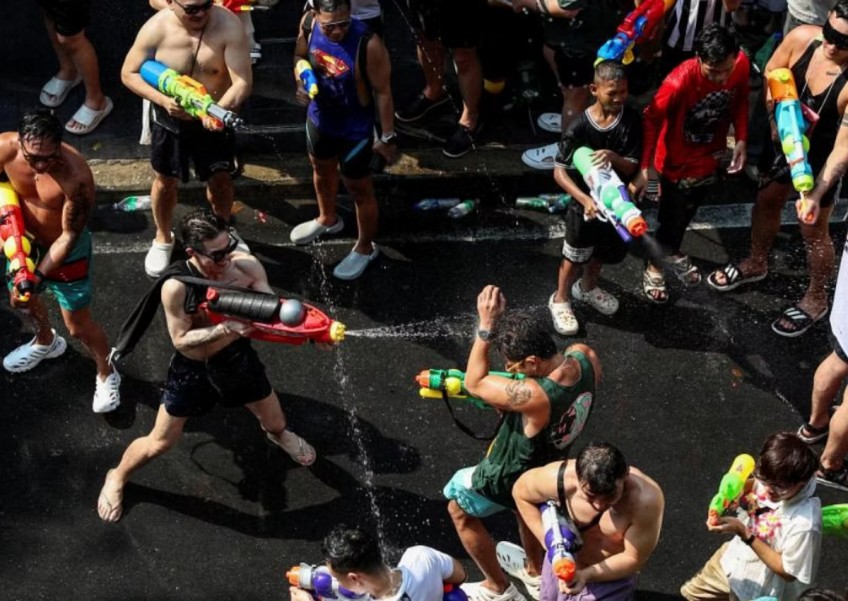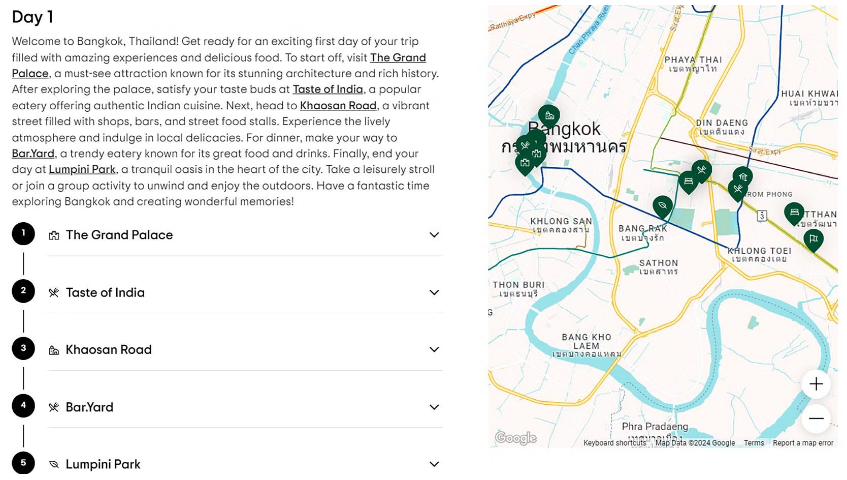Putting AI travel planners to the test: How well can they put together a holiday itinerary for Bangkok?


SINGAPORE — Where people seek travel advice has always mirrored their broader relationship with technology.
From modern guidebooks to early travelogues from Song Dynasty China or the ancient Greeks, travel guides have long been a trusted source of information for those keen to know more about faraway locales.
These guides have faced numerous challengers over the centuries, from the early phone-driven travel agencies to the dynamic pricing models of online booking platforms and websites of the internet age.
In a nod to changing times, Lonely Planet, the stalwart of travel guides, said in 2023 that it was developing its own AI tool.
As with numerous other industries, AI is entering the fray in the travel sector too. The real question, though, is how these tools compare with their traditional counterparts.
I tested several AI travel planners — including Layla, GuideGeek and Tripadvisor's AI trip builder — to put together an itinerary for a three-day trip to Bangkok, with a focus on recommendations for nightlife, outdoor adventures and hidden culinary gems.
At first glance, the results were underwhelming.
For example, Tripadvisor's AI trip builder recommended starting the day at Bangkok's Grand Palace, followed by lunch at Taste of India for "authentic Indian cuisine" before a midday visit to legendary nightlife area Khaosan Road, dining at the tiki-themed rooftop eatery Bar.Yard, and winding down at Lumpini Park.
AI travel planning app Layla suggested beginning the second day with breakfast at Somtum Der, "known for its authentic Som Tum". The itinerary continued with a hike up Golden Mount temple, followed by a long sequence of culinary stops including lunch at Supanniga Eating Room, a street-food tasting tour, dinner at fine-dining restaurant Gaggan Anand, and concluding the day at the Asiatique The Riverfront night market.
Meanwhile, travel chatbot GuideGeek's itinerary for the third day recommended almost exclusively stops for food. These included visiting the trendy Ari neighbourhood known for its cafes and street food, the Or Tor Kor Market and the Talad Rot Fai Night Market.
Overall, these itineraries were unusable without the traveller making considerable changes, stringing together popular attractions in impractical sequences that defy the laws of time, geography and how much food one can realistically stuff into one's belly.
With Layla and Tripadvisor, these recommendations were also interspersed with marketing links for tours and hotels.
Worse, these recommendations were also formulaic, rarely straying from the well-trodden path of tourist attractions which dominate Google and Tripadvisor's top results. Here, AI's limited ability to work with data it does not possess — about hidden gems and local insights — comes to the fore.
And, unlike a travel guide or content creator, the ChatGPT-like responses lacked the personal touches and insights that explain the significance of each site and why it might be worth a visit. Instead, its robotic and non-descriptive text falls short when compared with a travelogue's prose.
Despite these shortcomings, all is not lost in the realm of AI-driven travel assistance.

In May, travel booking website Kayak introduced a suite of AI tools, including one that produces tailored flight recommendations for specific queries like "best flights to beach destinations under $500".
Another feature allows users to upload screenshots of a potential flight to see if cheaper options are available — a useful tool, given the overwhelming number of booking options online.
Google, too, has also been enhancing its travel offerings with AI by integrating the technology into Google Maps to summarise large volumes of user reviews at a glance, and by updating its Google Lens feature to act as a "personal tour guide" by scanning objects like artworks at a museum. These have few parallels among travel services today.
For now, a complete transition to AI-driven travel planning seems distant. Yet, these tools might find their true potential — not in replicating the humble guidebook, but in pioneering new ways of travel planning that we have yet to imagine.
ALSO READ: 'A crazy time-saver': Man uses ChatGPT to plan Europe itinerary in 2 minutes
This article was first published in The Straits Times. Permission required for reproduction.